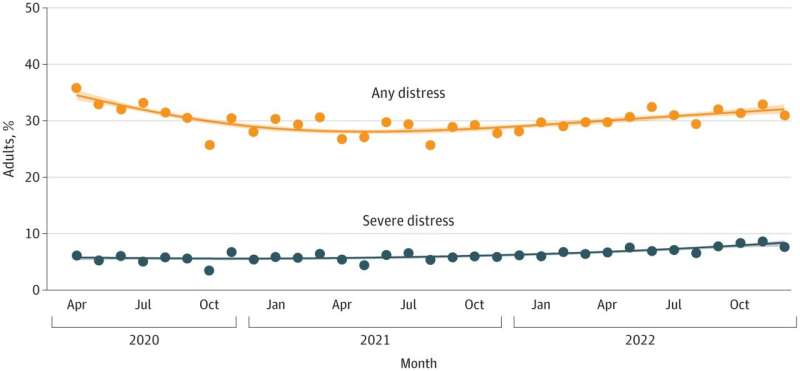This article has been reviewed according to Science X's editorial process and policies. Editors have highlighted the following attributes while ensuring the content's credibility:
fact-checked
peer-reviewed publication
trusted source
proofread
One in five young adults experiencing severe distress in England, new study finds

The number of people reporting feelings of severe distress in England has steadily risen since the beginning of the pandemic, according to a new study led by researchers at UCL, King's College London and the SPECTRUM Consortium.
The research, published in JAMA Network Open, establishes that rising levels of severe distress are being reported in all age groups and population subgroups outside of older adults aged over 65, with young adults aged 18–24 showing the most striking rise. One in five 18 to 24-year-olds were classified as experiencing "severe distress" in the most recent survey in December 2022.
Researchers suggest that this provides evidence of a growing mental health crisis in England and underscores an urgent need to address the cause of this and adequately fund mental health services.
Between April 2020 and December 2022, 51,861 adults provided data to the Smoking and Alcohol Toolkit study on how often in the last 30 days they had experienced various negative feelings, such as worthlessness or hopelessness. Responses were on a 5-point scale, and classified as "severe" using established cut-offs.
When analyzing the data, researchers found that the proportion of adults reporting severe distress rose steadily over the course of the study, from 5.7% to 8.3%. The researchers observed a rise in rates of severe distress across all subgroups under the age of 65, but the sharpest rise was seen in 18 to 24-year-olds in the second half of the study's period—from 13.6% in December 2021 to 20.2% in December 2022. In contrast, the proportion of adults reporting any distress remained steady at about a third.
Participants from low-income backgrounds also saw sharp rises in reports of severe distress, which researchers suggest could be due to the cost-of-living-crisis. A survey conducted in July 2022 found more than two fifths (42%) of people living in the most deprived areas in England had cut back on food and essentials, compared with 27% of those living in more well-off areas.
Lead author Dr. Sarah Jackson (UCL Institute of Epidemiology & Health Care) said, "The high burden of mental health problems in England is not necessarily a new concern, but recent events appear to have exacerbated the problem and caused existing inequalities in mental health to deepen."
"Groups with particularly high rates of distress include young adults, women, non-binary people, people working in routine and manual occupations, and people who smoke. This burden has been made worse by a particularly sharp rise in severe distress since 2021 among 18 to 24-year-olds. Focused action is urgently needed to tackle the causes of poor mental health in the population and provide support to those who need it."
Dr. Leonie Brose, the study's senior author from the Institute of Psychiatry, Psychology & Neuroscience (IoPPN) at King's College London, said, "The last three years have seen an unprecedented series of events that can be seen to be contributing to a worsening in people's mental health; a pandemic, a cost-of-living crisis, and a healthcare crisis."
"Our study shows that England's well-being is steadily getting worse. The number of people reporting severe distress is growing in all age groups from all economic backgrounds—only the over 65s appear to be avoiding this. What's required now is a strategy that puts equality, well-being and sustainability at the heart of society's response."
Mark Rowland, CEO, Mental Health Foundation and Chair of the Mental Health and Smoking Partnership, said, "These findings illustrate the urgent need to address the mental health consequences of the pandemic. If we don't prevent high levels of psychological distress, particularly among young and disadvantaged groups, this will feed through into greater mental and physical ill-health, impacting productivity and requiring more support from already stretched services."
"It is a false economy not to invest in public mental health approaches that build social capital and support those at risk. We urgently need to turn words about prevention into a dedicated strategy from government that drives greater investment into preventing mental health problems across our population."
More information: Sarah E. Jackson et al, Trends in Psychological Distress Among Adults in England, 2020-2022, JAMA Network Open (2023). DOI: 10.1001/jamanetworkopen.2023.21959



















